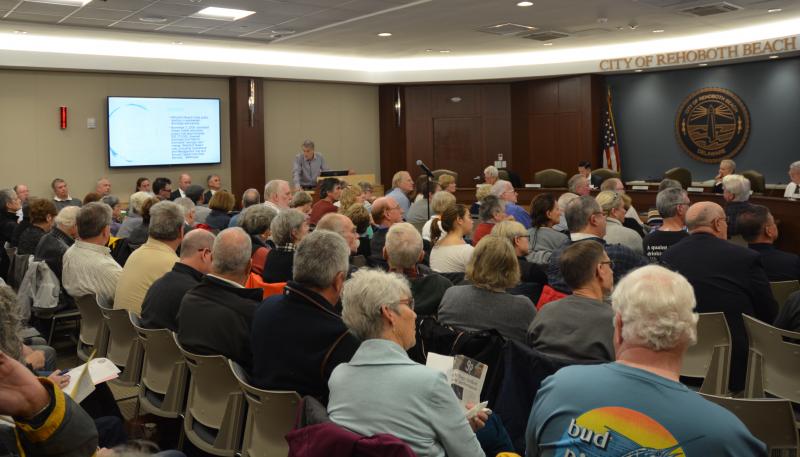Citizens: Rehoboth should keep its wastewater system
Rehoboth commissioners hosted a town hall meeting Jan. 5 to discuss a proposed county takeover of the city’s wastewater treatment facility. If commissioners base their decision on two hours of intense public testimony, the city will hold onto its asset.
Among opponents of the proposed plan was former Mayor Sam Cooper, who blasted a consultant’s report as inaccurate and questioned why residents should agree, going forward, for the county to receive about $500,000 more for sewer service than the city would receive.
City property owners are facing rate increases to pay for its new, $42 million ocean outfall and about $24 million more for system upgrades. The city approved about a quarter of the upgrades in August; under the city’s ownership of the system, the county pays for about half that cost to cover households outside of Rehoboth served by Rehoboth’s system.
City officials commissioned a rate study by Massachusetts-based Abrahams Group that predicted necessary rate increases for an average user. In early November, in executive session, city officials concluded a presentation of the rate study with a discussion with county officials about taking over the wastewater system. A couple of weeks later, county officials publicly presented a plan to take over the system.
More than 150 people – overflowing the meeting room to two additional locations – showed up for the meeting, which began with a presentation by Mayor Paul Kuhns. He said the wastewater facility is designed to process 3.4 million gallons a day, and in 2018 the average was about 1 million gallons a day. He said a 2009 study showed an average user of approximately 150 gallons a day, with an average bill $325 a year.
When the referendum approving the outfall passed in 2015, Kuhns said, it was estimated the average user’s bill would increase to approximately $760 a year. More recently, the Abrahams Group rate study put the average annual bill at $581. The study says that user would see an increase to $930 for fiscal year 2019-20.
Kuhns said he approached the county about the possible takeover for a few reasons: The city is paying for unused capacity, which the county could utilize by tapping into the system; wastewater treatment plant Supervisor Bob Stenger is retiring at the end of January after more than three decades, and four other staff people are retiring by the end of the year.
Kuhns said the plant also needs $18 million in improvements, but the city does not have the borrowing capacity to pay for them; the city risks a plant shutdown and permit violations if it waits too long for the upgrades. He said if a plant shutdown were to occur, the county’s offer would quickly be much less.
Representing the county was Finance Director Gina Jennings, who explained the county’s equivalent dwelling unit billing system, which is a flat fee, unlike the city’s system, which is based on how much water each household uses. Jennings said the county charges $300 per EDU, plus Rehoboth residents would continue to pay a debt service fee of $387 to pay for the outfall. She said additional capital improvements would add about $22 more to the user’s bill.
Using the Abrahams report, Jennings said not counting future upgrades, about 45 percent of the city’s users would not benefit by turning the system over the county. Property owners whose usage falls at some point between 20,000 gallons and 40,000 gallons a year would pay less if the county takes over the system. Even with the capital improvements added to the bill, she said the break-even point falls in the same range.
In his presentation, County Engineer Hans Medlarz said the city has significantly increased its wastewater assets. He said prior to the outfall, the discharge asset was a 50-foot-long pipe that went into the Lewes-Rehoboth Canal. That pipe was replaced, he said, with a high-debt outfall, which also brings with it high maintenance costs.
Medlarz said the original system dates to the 1930s, and it will need significant improvements. He said the city also operates a number of pump stations, which also need to be upgraded.
“These are the assets we would be maintaining,” he said, estimating the county overall does half-a-dozen pump station upgrades a year.
Medlarz noted the county doesn’t want any more land than necessary to operate the system. He added there is not enough land available near the treatment plant to increase the plant’s capacity.
After some continued prodding by Commissioner Toni Sharp, Medlarz said the biggest advantage to the county for taking over the system is the flexibility a future clean-water connection to the outfall would provide. This past year, Sussex County saw more than 60 inches of rain, Medlarz said, and the county’s spray irrigation system is not designed to work with that much rain falling on the irrigation fields.
Commissioner Stan Mills said he had not made up his mind, but he said he wanted to exhaust all options, including the creation of a special committee to examine the issue in more detail. Another option, he said, to resolve the inequities in the county’s flat-rate billing system, could be for the county to charge the city as a whole, and then have the city charge individual users.
Later in the meeting, Medlarz said some residential communities in the county also operate under this system.
Mills said he was glad the county wasn’t actively pushing for a decision and had not set a hard deadline.
Medlarz quickly made it clear county officials could wait a few months, but they are not going to wait years for a decision.
Public comment
During the public comment period, citizen after citizen criticized the county’s flat-rate user system, saying it would create inequities that would result in the majority of property owners subsidizing large rental owners and businesses.
Susan Gay spoke on behalf of the Rehoboth Beach Homeowners’ Association, which she said has 550 members. She said the association got a larger response on this issue than anything they’ve ever sent out, and every last response was concerned over the inequity of a flat-rate structure.
Gay said the association looked at 2,115 residential meters. She said the top 25 percent of those users use roughly 62 million gallons of water, while the remaining 75 percent, about 1,600 households, use approximately 38 million gallons, noting individual household water usage ranges from 1,000 gallons a year to more than 1 million gallons a year.
Gay said under a flat-rate system, low- to medium-users would be paying hundreds of dollars a year more, while high users, including owners of large rental properties, would save thousands of dollars a year on their wastewater bills.
“Think about who’s paying that. It’s the renters. It’s the tourists. It’s the visitors,” said Gay. “They’ve been paying it, and they’re going to keep paying it, but the city won’t being seeing that revenue; instead the owner will be pocketing that revenue.”
Stockley Street resident Michael Strange said the city has a fiscal problem, while the county has a physical problem. The county’s spray irrigation system is going to tank going forward because of climate change that Sussex County cannot control, so officials must seek alternative methods of discharge, he said.
Strange said the Abrahams report was inappropriate because it didn’t cover the entire life expectancy of wastewater assets.
“You don’t make long-term decisions based on short-term fiscal analysis,” he said.
Other citizens criticized the loss of control over the wastewater system. Henlopen Avenue property owner Bill Richardson said once the city relinquishes control, the citizens won’t be able to call commissioners to complain about an issue.
“My concern is that, upon approval of the shift in management and ownership, we will instantly become a minority, without the voice we have today, with the effluent going into our backyard,” said Richardson.
Country Club Drive property owner Brian Patterson reminded everyone this wasn’t the first discussion of joint use of the outfall. He said in 2009, the city and the county had discussed a joint ocean outfall, allowing the county to connect the Wolfe Neck Treatment Facility and share costs, but ultimately the county walked away.
“We had to build this outfall all on our own,” said Patterson, “and here we are, the very first year it’s been commissioned, and now we’re looking at the possibility of turning it over to the county so they can do whatever they want, and what they want to do is connect Wolfe Neck into the outfall pipe so they have that flexibility.”
Patterson said this is not the way a responsible government decides to dispose of a major asset. No specifications have been set, nothing has gone out to the public, and there’s been no study of the value of the wastewater treatment plant, he said.
“We just spent $42 million, and you’re just going to give it away – without even knowing what the underlying value is and without doing any real, true estimate of the value to the county of getting access to the outfall so they can add the additional capacity,” Patterson said.
Beginning with the average user’s bill, former Mayor Sam Cooper called into question the statistics used by the Abrahams report.
He said nothing supports the report’s average user cost of $581. He said his evaluation of system users puts that cost at below $440. He said the report also cites 2,800 metered accounts, but he said there are only 2,385. “I don’t know where they got their statistics,” he said.
Cooper also called into question the total impact on city ratepayers. He said the county estimates the total number of EDUs in the city at 3,250, while he estimates it at closer to 4,500. He said this means, as a whole, ratepayers would be paying roughly $500,000 more to the county for the same service now provided by the city.
After being asked to explain the use of EDUs, Medlarz said the county uses that method of billing because it would be nearly impossible to get a flow-rate metering system installed without substantially increasing the cost to users. He said nearly half the of the county’s more than 70,000 users are still on private wells.
At the conclusion of the meeting, several commissioners asked about creating a committee to consider the proposal, but no further meeting dates were set.
Editor’s note: This story has been changed to say Bill Richardson is a Henlopen Avenue property owner.
Chris Flood has been working for the Cape Gazette since early 2014. He currently covers Rehoboth Beach and Henlopen Acres, but has also covered Dewey Beach and the state government. He covers environmental stories, business stories and random stories on subjects he finds interesting, and he also writes a column called Choppin’ Wood that runs every other week. He’s a graduate of the University of Maine and the Landing School of Boat Building & Design.
























































